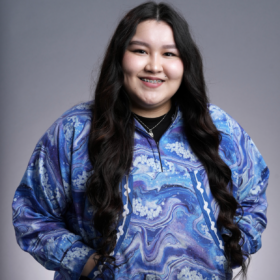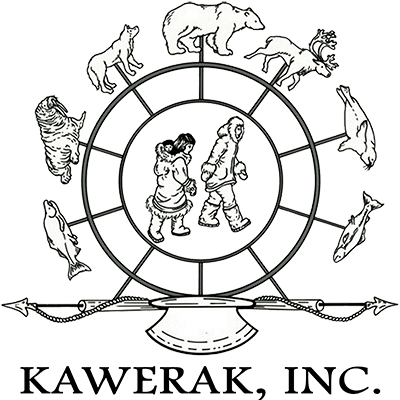What drew you to the Caleb Scholars Program?
Being in the program this past year, I got to learn more about who Caleb Lumen Pungowiyi was through the people, program, and the CSP Mission and Values. Mr. Pungowiyi filled many significant roles and it’s an honor not only to see the work being carried on through education, stewardship, mentorship, and financial support, but to also be a part of it alongside my peers. The CSP provides its scholars and recipients with abundant and unique opportunities to enhance and advocate for Inuit-led conservation, and these proactive and collective efforts help protect our Alaskan communities and resources.
What are your educational and career goals? How do your goals relate to environmental conservation?
My educational goal is to obtain my double major bachelor’s degree in Social Work and Inupiaq Language from UAF, which I will earn in the spring of 2025. I am passionate about language and wellness efforts, especially on the university level. My career goal is to become an academic advisor and wellness counselor to support rural and Alaska Native students. These aspirations derive from having navigated through my own journey and prove that obstacles can be turned into opportunities.
From a wellness perspective, I believe these goals relate to environmental conservation because to care for our land, water, and environment is to care for the well-being of the people who reside in our communities and to build up leaders who will pass down ancestral knowledge. How can we sustain our culture, heritage, and traditional way of life without healthy people who make it up, live in its values, and protect all that it encompasses? Maintaining a healthy relationship with the natural environment, resources, and our well-being is a vital way of ensuring cultural continuity for generations to come.
What does Inuit-led conservation advocacy mean to you?
Inuit-led conservation advocacy is taking part in ensuring we have healthy ecosystems, abundant wildlife habitat, and protected resources to continue thriving and living our traditional way of life. It’s caring for our natural environment as it is the center of our culture and a significant contributor to our well-being as Inupiat people. It’s being aware of any threats that put these components in danger and using our voice to advocate against it. Inuit-led conservation advocacy work is important in the rural communities we call home and is an opportunity to preserve and protect our lands, heritage, traditions, and our subsistence livelihood, just as our ancestors did.
How do you engage with environmental issues/conservation advocacy in school and/or at home?
I engage with environmental matters by continually reflecting on how I was raised in Iñupiaq culture and values and living by that each day. When out on the land or the waters, we are encouraged to take our trash with us, to take only what we need, and not to leave anything behind, especially when fish and game are involved. I also keep up to date on the latest events that happen and share and advocate via social media. Together, we can do something to protect that which surrounds us through our actions and in our everyday lives.
Please share a reflection of when you have felt a connection to the ocean or the
land.
Growing up in Selawik, there was (and still is) an annual fall Culture Camp for the youth, elders, and community members to engage in cultural activities and to protect and carry on our traditional ways of life. We’d berry pick, hunt, cut fish, pick plants for medicinal uses, learn how to make niqipiaq (real/native food), listen to storytellers, observe waterways and the land, and learn from those who came before us. Reflecting on these culture camp experiences give me such warm and grateful feelings because they are a vital way our Iñupiaq culture and ancestral knowledge gets passed down to the next generations and are how we become good stewards of the land and water. I am thankful to have participated in such events that connect me closer to my culture and people, deepen my relationship with the natural environment, and remind me of the great responsibility I have to advocate for conservation efforts in our rural communities.

